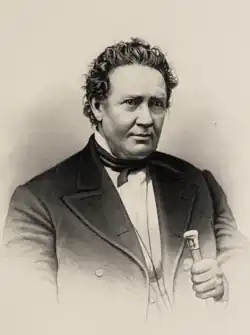1862–63 United States Senate elections
| ||||||||||||||||||||||||||||||||||||||||||||||||||||||||||||||
22 of the 68 seats in the United States Senate[a] (with special elections) 25 seats needed for a majority | ||||||||||||||||||||||||||||||||||||||||||||||||||||||||||||||
|---|---|---|---|---|---|---|---|---|---|---|---|---|---|---|---|---|---|---|---|---|---|---|---|---|---|---|---|---|---|---|---|---|---|---|---|---|---|---|---|---|---|---|---|---|---|---|---|---|---|---|---|---|---|---|---|---|---|---|---|---|---|---|
| ||||||||||||||||||||||||||||||||||||||||||||||||||||||||||||||
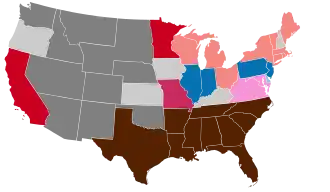 Results of the elections: Democratic gain Democratic hold Republican gain Republican hold Unionist Hold Unconditional Unionist Gain Confederacy | ||||||||||||||||||||||||||||||||||||||||||||||||||||||||||||||
| ||||||||||||||||||||||||||||||||||||||||||||||||||||||||||||||
The 1862–63 United States Senate elections were held on various dates in various states, occurring during the American Civil War. As these U.S. Senate elections were prior to the ratification of the Seventeenth Amendment in 1913, senators were chosen by state legislatures. Senators were elected over a wide range of time throughout 1862 and 1863, and a seat may have been filled months late or remained vacant due to legislative deadlock.[1] In these elections, terms were up for the senators in Class 1.
Since many Southern states seceded in 1860 and 1861, six senators resigned to join the Confederacy, and 14 were expelled for supporting the rebellion: these seats were declared vacant. To establish a quorum with fewer members, a lower total seat number was taken into account.
The Republican Party increased their control of the Senate by gaining three seats, bringing their majority to two-thirds of the body. Also caucusing with them were Unionists and Unconditional Unionists, giving them a commanding majority.
Results summary
Senate party division, 38th Congress (1863–1865)
- Majority party: Republican (31), later rose to 33
- Minority party: Democratic (10)
- Other parties: Unionist (4), later dropped to 3; Unconditional Unionist (3), later rose to 4
- Vacant: 20, later rose to 22
- Total seats: 48, later rose to 50
Change in composition
Before the elections
At the beginning of 1862.
| V4 | V3 | V2 | V1 | ||||||
| V5 | V6 | V7 Fla. No race |
V8 Miss. No race |
V9 Tenn. No race |
V10 Texas No race |
D1 | D2 | D3 | D4 |
| U4 Md. Unknown |
U3 | U2 | U1 | U10 Mo. Expelled |
D9 Minn. Retired |
D8 Del. Ran |
D7 Calif. Ran |
D6 | D5 |
| U5 Ind. Retired |
U6 Va. Retired |
R32 N.J. Retired |
R31 Pa. Retired |
R30 R.I. Unknown |
R29 Wis. Ran |
R28 Vt. Ran |
R27 Ohio Ran |
R26 N.Y. Ran |
R25 Mich. Ran |
| Majority → | |||||||||
| R15 | R16 | R17 | R18 | R19 | R20 | R21 | R22 Conn. Ran |
R23 Maine Ran |
R24 Mass. Ran |
| R14 | R13 | R12 | R11 | R10 | R9 | R8 | R7 | R6 | R5 |
| V16 | V15 | V14 | V13 | V12 | V11 | R1 | R2 | R3 | R4 |
| V17 | V18 | V19 | V20 | ||||||
As a result of the elections
| V4 | V3 | V2 | V1 | ||||||
| V5 | V6 | V7 Fla. No race |
V8 Miss. No race |
V9 Tenn. No race |
V10 Texas No race |
D1 | D2 | D3 | D4 |
| U4 Md. Hold |
U3 | U2 | U1 | D10 Pa. Gain |
D9 N.J. Gain[c] |
D8 Ind. Gain[c] |
D7 Del. Re-elected |
D6 | D5 |
| U5 Va. Hold |
UU1 Mo. Gain[d] |
R32 Minn. Gain |
R31 Calif. Gain |
R30 R.I. Hold |
R29 N.Y. Hold |
R28 Wis. Re-elected |
R27 Vt. Re-elected |
R26 Ohio Re-elected |
R25 Mich. Re-elected |
| Majority → | |||||||||
| R15 | R16 | R17 | R18 | R19 | R20 | R21 | R22 Conn. Re-elected |
R23 Maine Re-elected |
R24 Mass. Re-elected |
| R14 | R13 | R12 | R11 | R10 | R9 | R8 | R7 | R6 | R5 |
| V16 | V15 | V14 | V13 | V12 | V11 | R1 | R2 | R3 | R4 |
| V17 | V18 | V19 | V20 | ||||||
Beginning of the next Congress
| V4 | V3 | V2 | V1 | ||||||
| V5 | V6 | V7 | V8 | V9 | V10 | D1 | D2 | D3 Ill. Gain[c] |
D4 |
| U4 | U3 | U2 | U1 | D9 | D9 N.J. Gain[c] |
D8 Ind. Gain[c] |
D7 | D6 | D5 |
| UU3 Md. Changed |
UU2 Mo. Changed |
UU1 | R31 | R30 R.I. Hold[c] |
R29 | R28 | R27 | R26 | R25 |
| Majority → | |||||||||
| R15 | R16 | R17 | R18 | R19 | R20 | R21 | R22 | R23 | R24 |
| R14 | R13 | R12 | R11 | R10 | R9 | R8 | R7 | R6 | R5 |
| V16 | V15 | V14 | V13 | V12 | V11 | R1 | R2 | R3 | R4 |
| V17 | V18 | V19 | V20 | ||||||
| Key: |
|
|---|
Race summaries
Special elections during the preceding Congress
Special elections were held to fill six vacancies in the 37th United States Congress.
| State | Incumbent | This race | |||
|---|---|---|---|---|---|
| Senator | Party | Electoral history |
Results | Candidates | |
| Michigan (Class 2) |
Kinsley S. Bingham | Republican | 1858 | Incumbent died October 5, 1861. New member elected January 4, 1862. Republican hold. |
First ballot (January 4, 1862)
|
| Oregon (Class 2) |
Benjamin Stark | Democratic | 1862 (ap.) | Interim appointee retired. New senator elected September 12, 1862. Union gain. |
Thirtieth ballot (September 12, 1862)
|
| Rhode Island (Class 1) |
James F. Simmons | Republican | 1841 1847 (lost) 1856 |
Incumbent resigned August 15, 1862 before the Senate could vote to expel him. New senator elected September 5, 1862.[2][3] Republican hold. Winner was not a candidate to the next term. |
|
| Missouri (Class 1) |
John B. Henderson | Union | 1862 (ap.) | Interim appointee elected with a new party January 6, 1863. Emancipation gain. |
First ballot (January 6, 1863)
|
| Illinois (Class 2) |
Orville H. Browning | Republican | 1861 (ap.) | Interim appointee retired. New member elected January 12, 1863. Democratic gain. |
First ballot (January 12, 1863)
|
| Indiana (Class 1) |
Joseph A. Wright | Union | 1862 (ap.) | Interim appointee retired. New member elected January 14, 1863. Democratic gain. |
First ballot (January 14, 1863)
|
| New Jersey (Class 1) |
Richard S. Field | Union | 1862 (ap.) | Interim appointee lost re-election January 14, 1863. Democratic gain. |
First ballot (January 14, 1863)
|
Elections leading to the next Congress
Eighteen senators were elected for the term beginning March 4, 1863.
| State | Incumbent | This race | |||
|---|---|---|---|---|---|
| Senator | Party | Electoral history |
Results | Candidates | |
| California | Milton Latham | Democratic | 1860 (sp.) | Incumbent retired. Union gain. |
First ballot (February 10, 1863)
|
| Connecticut | James Dixon | Republican | 1856 | Incumbent re-elected with a new party. Union gain. |
First ballot (May 22, 1862)
|
| Delaware | James A. Bayard | Democratic | 1851 1857 |
Incumbent re-elected. | First ballot (January 8, 1863)
|
| Florida | Vacant | Seat vacant since March 14, 1861. No election. |
None. | ||
| Indiana | Joseph A. Wright | Union | 1862 (ap.) | Interim appointee lost re-election. Democratic gain. |
First ballot (January 14, 1863)
|
| Maine | Lot M. Morrill | Republican | 1861 (sp.) | Incumbent re-elected. | First ballot (January 13, 1863)
|
| Maryland | Anthony Kennedy | American | 1856–57 | Incumbent retired. Union gain. |
First ballot (March 5, 1862)
|
| Massachusetts | Charles Sumner | Republican | 1851 1857 |
Incumbent re-elected. | First ballot (January 15, 1863)
|
| Michigan | Zachariah Chandler | Republican | 1857 | Incumbent re-elected. | First ballot (January 8, 1863)
|
| Minnesota | Henry Mower Rice | Democratic | 1858 | Incumbent retired. Republican gain. |
First ballot (January 14, 1863)
|
| Mississippi | Vacant | Seat vacant since March 14, 1861. No election. |
None. | ||
| Missouri | John B. Henderson | Emancipation | 1863 (sp.) | Incumbent re-elected with a new party. Radical Union gain. |
First ballot (November 13, 1863)
|
| New Jersey | James W. Wall | Democratic | 1863 (sp.) | Incumbent lost re-nomination. Democratic hold. |
First ballot (February 26, 1863)
|
| New York | Preston King | Republican | 1857 | Incumbent lost renomination. Union gain. |
First ballot (February 3, 1863)
|
| Ohio | Benjamin Wade | Republican | 1851 1856 |
Incumbent re-elected with a new party. Union gain. |
First ballot (January 22, 1863)
|
| Pennsylvania | David Wilmot | Republican | 1861 (sp.) | Incumbent lost renomination. Democratic gain. |
First ballot (January 13, 1863)
|
| Rhode Island | James F. Simmons | Republican | 1841 1847 (lost) 1856 |
Incumbent resigned August 15, 1862 before the Senate could vote to expel him. New senator elected in 1862. Republican hold. Winner was not a candidate to finish the term. |
|
| Tennessee | Vacant | Seat vacant from March 4, 1862. No election. |
None. | ||
| Texas | Vacant | Seat vacant from July 11, 1861. No election. |
None. | ||
| Vermont | Solomon Foot | Republican | 1850 1856 |
Incumbent re-elected in 1862. |
|
| Virginia | Waitman T. Willey | Unionist | 1861 (special) | Incumbent retired. New senator elected in 1863. Unionist hold. |
|
| West Virginia 2 seats |
None (new state) | West Virginia admitted to the Union June 19, 1863. Senator elected August 4, 1863. Unconditional Unionist gain. |
| ||
| West Virginia admitted to the Union June 19, 1863. Senator elected August 4, 1863. Unconditional Unionist gain. | |||||
| Wisconsin | James R. Doolittle | Republican | 1857 | Incumbent re-elected on January 22, 1863.[5] |
|
Special elections during the next Congress
In these elections, the winners were elected in 1863 after March 4; ordered by election date.
| State | Incumbent | This race | |||
|---|---|---|---|---|---|
| Senator | Party | Electoral history |
Results | Candidates
| |
| Missouri (Class 3) |
Robert Wilson | Union | 1862 (ap.) | Interim appointee retired. New member elected November 13, 1863. Radical Union gain. |
Thirty-second ballot (November 13, 1863)
|
California
| ||||||||||||||
Members of the California State Legislature Majority of voting members needed to win | ||||||||||||||
|---|---|---|---|---|---|---|---|---|---|---|---|---|---|---|
| ||||||||||||||
| ||||||||||||||
Incumbent Democrat Milton Latham was elected in 1860 to fill the vacancy created by the death of David C. Broderick.[6] He was not a candidate for re-election.[7]
The Union members of the legislature held a caucus from January 13 to February 9, 1863.[8] Timothy G. Phelps, John Conness, Aaron A. Sargent, and Trenor W. Park were the major candidates. Phelps led on the first ballot, but without a majority. During the balloting, an internal inquiry found that Phelps's supporters had offered bribes to several members in exchange for their votes. Although Phelps denied the allegations, the stigma of corruption in effect ended his candidacy.[9] Conness was nominated on the final ballot with 60 votes to 29 for Sargent, three for Phelps, and eight for other candidates.[10]
The California State Legislature met in joint session on February 10, 1863, to hold an election for the next term.[11] Conness defeated the Democratic candidate Benjamin Shurtleff on the first ballot.[12]
Connecticut
| |||||||||||||||||
Members of the Connecticut General Assembly Majority in both houses needed to win | |||||||||||||||||
|---|---|---|---|---|---|---|---|---|---|---|---|---|---|---|---|---|---|
| |||||||||||||||||
| |||||||||||||||||
One-term Republican James Dixon was elected in 1856.[6]
The Union members of the legislature held a caucus on May 15, 1862. Dixon, William A. Buckingham, Roger S. Baldwin, and Orris S. Ferry were the leading candidates. Dixon defeated the other candidates on the first ballot.[13]
The Senate and the House of Representatives met separately on May 22, 1862, to hold an election for the next term.[13] Dixon defeated the Democratic candidate Charles Chapman on the first ballot.[14]
Delaware
| ||||||||||||||
Members of the Delaware General Assembly Majority of voting members needed to win | ||||||||||||||
|---|---|---|---|---|---|---|---|---|---|---|---|---|---|---|
| ||||||||||||||
| ||||||||||||||
Two-term Democrat James A. Bayard was re-elected in 1857.[15]
The Delaware General Assembly met in joint session on January 8, 1863, to hold an election for the next term. Bayard defeated the Union candidate Edward G. Bradford on the first ballot.[16][17]
Florida
| |||
|
| |||
| |||
Two-term Democrat Stephen Mallory withdrew from the Senate on March 14, 1861, following the secession of Florida. The Florida Legislature did not hold an election for the next term, and the seat remained vacant until 1868.[18]
Illinois (special)
| ||||||||||||||
Members of the Illinois General Assembly Majority of voting members needed to win | ||||||||||||||
|---|---|---|---|---|---|---|---|---|---|---|---|---|---|---|
| ||||||||||||||
| ||||||||||||||
Incumbent Republican Orville H. Browning was appointed in 1861 to fill the vacancy created by the death of Stephen A. Douglas.[19] He was not a candidate for re-election.
The Illinois General Assembly met on January 12, 1863, to hold a special election for the unexpired term. The Democratic candidate William A. Richardson defeated the Union candidate Richard Yates on the first ballot.[20]
Indiana
Incumbent Unionist Joseph A. Wright was appointed in 1862 to fill the vacancy created by the expulsion of Jesse D. Bright. With Bright's expulsion coming little more than a year before the end of his term on March 4, 1863, the Indiana General Assembly would hold concurrent elections in January 1863: a special election for the remainder of the unexpired term, and the regularly scheduled election for the next term.[21]
The Democratic members of the legislature held a caucus on January 9, 1863. David Turpie was nominated for the unexpired term and Thomas A. Hendricks was nominated for the next term.[22]
The General Assembly met in joint session on January 14, 1863, to hold concurrent elections for both terms. Turpie and Hendricks were respectively elected.[23]
Indiana (special)
| ||||||||||||||
Members of the Indiana General Assembly Majority of voting members needed to win | ||||||||||||||
|---|---|---|---|---|---|---|---|---|---|---|---|---|---|---|
| ||||||||||||||
| ||||||||||||||
Wright was not a candidate in the special election. Turpie defeated the Union candidate Daniel D. Pratt on the first ballot.[24]
Indiana (regular)
| ||||||||||||||
Members of the Indiana General Assembly Majority of voting members needed to win | ||||||||||||||
|---|---|---|---|---|---|---|---|---|---|---|---|---|---|---|
| ||||||||||||||
| ||||||||||||||
Turpie was not a candidate for the next term. Hendricks defeated Wright on the first ballot.[25]
Maine
| |||||||||||||||||
Members of the Maine Legislature Majority in both houses needed to win | |||||||||||||||||
|---|---|---|---|---|---|---|---|---|---|---|---|---|---|---|---|---|---|
| |||||||||||||||||
| |||||||||||||||||
Incumbent Republican Lot M. Morrill was elected in 1861 to fill the vacancy created by the resignation of Hannibal Hamlin.[26]
The Senate and the House of Representatives met separately on January 13, 1863, to hold an election for the next term. Morrill defeated the Democratic candidate William P. Haines on the first ballot.[27]
Maryland
| ||||||||||||||
Members of the Maryland General Assembly Majority of voting members needed to win | ||||||||||||||
|---|---|---|---|---|---|---|---|---|---|---|---|---|---|---|
| ||||||||||||||
| ||||||||||||||
One-term Unionist Anthony Kennedy was elected in 1856 or 1857.[28] He was not a candidate for re-election.
The Maryland General Assembly met on March 5, 1862, to hold an election for the next term. Voting proceeded separately in the Senate and the House of Delegates, after which the tellers withdrew and to count the ballots in the Senate chamber. The Union candidate Reverdy Johnson was elected on the first ballot.[29]
Massachusetts
| |||||||||||||||||
Members of the Massachusetts General Court Majority in both houses needed to win | |||||||||||||||||
|---|---|---|---|---|---|---|---|---|---|---|---|---|---|---|---|---|---|
| |||||||||||||||||
| |||||||||||||||||
Two-term Republican Charles Sumner was re-elected in 1857.[30]
The Republican state convention met at Worcester, Massachusetts, on September 9, 1862. Sumner had earned the disapproval of Conservative Republicans when he opposed Lincoln's plan for gradual emancipation in March 1862, calling instead for Congress to use its authority under the War Powers Clause to abolish slavery immediately. Seeking to preempt a movement to replace Sumner at the next senatorial election, Sumner's allies took the unusual step of having the state convention endorse his bid for re-election. A resolution endorsing Sumner and approving his course in the Senate passed over the protests of conservative delegates, in effect making Sumner's re-election the central issue of the fall campaign.[31]
Conservative opponents of Sumner held a convention at Boston on October 7, 1862.[32] Many of the organizers of the convention were former Whigs who had supported the Constitutional Union Party in 1860.[33] In a nod to antipartisan wartime rhetoric, the movement called itself the People's Party; its express purpose was to defeat Sumner's bid for reelection. The convention adopted a pro-war, anti-abolitionist platform and selected candidates for the upcoming state elections; Charles F. Adams was nominated for U.S. senator, but declined. The preliminary Emancipation Proclamation, issued September 22, had brought the Lincoln administration into line with Sumner's position, while the endorsement of the People's ticket by the Massachusetts Democratic Party undermined the movement's claim to constitute the true pro-administration party in Massachusetts. Following these events, most Conservative Republicans returned to the fold, and the Republican ticket was elected by a large majority.[34]
The Senate and the House of Representatives met separately on January 15, 1863, to hold an election for the next term. Sumner defeated the People's candidate Josiah G. Abbott on the first ballot.[35]
Michigan
There were two elections in Michigan, due to the death of Kinsley S. Bingham.
Michigan (special)
| |||||||||||||||||
Members of the Michigan Legislature Majority in both houses needed to win | |||||||||||||||||
|---|---|---|---|---|---|---|---|---|---|---|---|---|---|---|---|---|---|
| |||||||||||||||||
| |||||||||||||||||
One-term Republican Kinsley S. Bingham was elected in 1858. Bingham died on October 5, 1861, causing a special election.[36]
The Republican members of the legislature held a caucus on January 3, 1862. Jacob M. Howard, Austin Blair, Hezekiah G. Wells, and Henry Waldron were the leading candidates. Howard was nominated on the sixth ballot.[37]
The Senate and the House of Representatives met separately on January 4, 1862, to hold a special election for the unexpired term. Howard defeated the Democratic candidate Alpheus Felch on the first ballot.[38]
Michigan (regular)
| |||||||||||||||||||||
Members of the Michigan Legislature Majority in both houses needed to win | |||||||||||||||||||||
|---|---|---|---|---|---|---|---|---|---|---|---|---|---|---|---|---|---|---|---|---|---|
| |||||||||||||||||||||
| |||||||||||||||||||||
One-term Republican Zachariah Chandler was elected in 1857.[36]
The Republican members of the legislature held a caucus on January 8, 1863. Chandler was renominated unanimously. The Democratic members met the same day and nominated James F. Joy over Alpheus Felch.[39]
The Senate and the House of Representatives met separately on January 8, 1863, to hold an election for the next term.[40] Chandler defeated Joy on the first ballot.[39]
Minnesota
| ||||||||||||||
Members of the Minnesota Legislature Majority of voting members needed to win | ||||||||||||||
|---|---|---|---|---|---|---|---|---|---|---|---|---|---|---|
| ||||||||||||||
| ||||||||||||||
One-term Democrat Henry M. Rice was elected in 1858.[36] He was not a candidate for re-election.
The Republican members of the legislature held a caucus from January 12–13, 1863. Alexander Ramsey, Cyrus Aldrich, David Cooper, William R. Marshall, and James Smith, Jr. were the major candidates.[41] Ramsey defeated Smith on the 25th ballot.[42]
The Minnesota Legislature met in joint session on January 14, 1863.[43] Ramsey defeated the Democratic candidate Andrew G. Chatfield on the first ballot.[44]
Mississippi
| |||
|
| |||
| |||
One-term Democrat Jefferson Davis withdrew from the Senate on March 14, 1861, following the secession of Mississippi. The Mississippi Legislature did not hold an election for the next term, and the seat remained vacant until 1870.[45]
Missouri
Three elections were held in Missouri, due to the expulsions of Trusten Polk and Waldo P. Johnson. With Polk's expulsion coming little more than a year before the end of his term on March 4, 1863, the Missouri General Assembly would hold special elections for both seats, followed by the regularly-scheduled election for the Class 1 seat.
Missouri Unionists were divided in their responses to emancipation and the related issue of Reconstruction. Three main ideological camps emerged: radical Charcoals, who supported immediate emancipation; conservative Claybanks, who favored Lincoln's initial plan of gradual emancipation; and ultra-conservative Snowflakes, who opposed emancipation altogether.[46] In St. Louis, the ideological divide resulted in a formal split between the Immediatist and Gradualist wings of the Emancipation Party.[47] Elections held in the fall of 1862 resulted in a clear majority for the Emancipationists in the General Assembly, while five conservatives and four radicals were elected to the U.S. House of Representatives.[48][e]
The Emancipation members of the legislature held a caucus on January 3, 1863.[50] The conservatives boycotted the proceedings.[51] John B. Henderson was nominated for the Class 1 seat and B. Gratz Brown was nominated for the Class 3 seat.[50]
The General Assembly met in joint session on January 6, 1863, to hold concurrent special elections for both seats.[52] Henderson was elected to the Class 1 seat for the term ending March 4. The special election for the Class 3 seat remained deadlocked after multiple rounds of voting, and the joint session adjourned without making a choice.[53]
The joint session reconvened in November 1863. In the interim, the radicals held a convention at Jefferson City that organized the Radical Union Party. The meeting nominated Brown for the Class 3 seat and Benjamin F. Loan for the Class 1 seat. The two conservative factions were aligned in support of the administration of Hamilton R. Gamble, but lacked a formal party organization.[54] Closely-fought judicial elections in the fall of 1863 helped to clarify party lines.[53] In the legislature, the Radical Unionists had 65 votes on the joint ballot, just short of an overall majority. The Radical Union members and Henderson-aligned conservatives held a caucus after the first round of voting on November 12 and agreed to form a coalition.[55] Brown was subsequently elected to the Class 3 seat and Henderson was re-elected to the Class 1 seat for the next term.[56]
Missouri (Class 1, special)
| |||||||||||||||||
Members of the Missouri General Assembly Majority of voting members needed to win | |||||||||||||||||
|---|---|---|---|---|---|---|---|---|---|---|---|---|---|---|---|---|---|
| |||||||||||||||||
| |||||||||||||||||
Incumbent Emancipationist John B. Henderson was appointed in 1862 to fill the vacancy created by the expulsion of Trusten Polk.[45]
The General Assembly met on January 6, 1863, to hold a special election for the unexpired term. Henderson defeated the conservative candidate Robert Wilson on the first ballot.[57]
Missouri (Class 3, special)
|
| ||||||||||||||||||||||||||||||||||||||||||||||||
First session | ||||||||||||||||||||||||||||||||||||||||||||||||
| ||||||||||||||||||||||||||||||||||||||||||||||||
Members of the Missouri General Assembly Majority of voting members needed to win | ||||||||||||||||||||||||||||||||||||||||||||||||
|---|---|---|---|---|---|---|---|---|---|---|---|---|---|---|---|---|---|---|---|---|---|---|---|---|---|---|---|---|---|---|---|---|---|---|---|---|---|---|---|---|---|---|---|---|---|---|---|---|
| ||||||||||||||||||||||||||||||||||||||||||||||||
Adjourned session | ||||||||||||||||||||||||||||||||||||||||||||||||
| ||||||||||||||||||||||||||||||||||||||||||||||||
Members of the Missouri General Assembly Majority of voting members needed to win | ||||||||||||||||||||||||||||||||||||||||||||||||
| ||||||||||||||||||||||||||||||||||||||||||||||||
| ||||||||||||||||||||||||||||||||||||||||||||||||
Incumbent conservative Robert Wilson was appointed in 1862 to fill the vacancy created by the expulsion of Waldo P. Johnson.[58] He was not a candidate for re-election to the Class 3 seat.
The General Assembly met from January 6–11, 1863, to hold a special election for the unexpired term.[52] Democrat John S. Phelps and Emancipationists B. Gratz Brown, Samuel T. Glover, Samuel M. Breckinridge, John W. Noell, and James Broadhead were candidates on the first ballot.[59] No candidate had a majority after the sixth ballot, and the joint session adjourned.[60]
The joint session met again from February 2–11, 1863. Phelps, Brown, Glover, Breckinridge, and Broadhead were candidates.[61] Noell's name was withdrawn, after which Phelps led on the seventh ballot, but without a majority.[62] No candidate had a majority after the thirtieth ballot, and the joint session adjourned.[63]
The joint session met a third time from November 12–13, 1863.[64] Brown was nominated by the Radical Unionists, while Broadhead received the votes of most of the Conservative members.[53] Brown defeated Broadhead on the 32nd ballot.[65]
Missouri (regular)
| |||||||||||||||||
Members of the Missouri General Assembly Majority of voting members needed to win | |||||||||||||||||
|---|---|---|---|---|---|---|---|---|---|---|---|---|---|---|---|---|---|
| |||||||||||||||||
| |||||||||||||||||
Incumbent Emancipationist John B. Henderson was elected in 1863 to fill the vacancy created by the expulsion of Trusten Polk.[45]
The General Assembly met on November 13, 1863, to hold an election for the next term. Henderson defeated Phelps on the first ballot.[66]
New Jersey
Incumbent Unionist Richard S. Field was appointed in 1862 to fill the vacancy created by the death of John R. Thomson. With Thomson's death coming less than a year before the end of his term on March 4, 1863, the New Jersey Legislature would hold consecutive elections in 1863: a special election for the unexpired term, and the regularly scheduled election for the next term.[67]
New Jersey (special)
| ||||||||||||||
Members of the New Jersey Legislature Majority of voting members needed to win | ||||||||||||||
|---|---|---|---|---|---|---|---|---|---|---|---|---|---|---|
| ||||||||||||||
| ||||||||||||||
The Democratic members of the legislature held a caucus on January 14, 1863. William Cook, Charles Skelton, Charles Sitgreaves, and James W. Wall were candidates. Cook led on the first two ballots, but without a majority. Skelton and Sitgreaves then withdrew, and Wall defeated Cook on the third ballot.[68]
The Legislature met in joint session on January 14, 1863, to hold a special election for the unexpired term.[69] Wall defeated Field on the first ballot.[68]
New Jersey (regular)
| ||||||||||||||
Members of the New Jersey Legislature Majority of voting members needed to win | ||||||||||||||
|---|---|---|---|---|---|---|---|---|---|---|---|---|---|---|
| ||||||||||||||
| ||||||||||||||
The Democratic members of the legislature held a caucus on February 25, 1863.[70] Wall and William Wright were candidates.[71] Wright was nominated on the 23rd ballot.[70]
The Legislature met in joint session on February 26, 1863, to hold an election for the next term.[72] Wright defeated the Union candidate William A. Newell on the first ballot.[73]
New York
| |||||||||||||||||||||||||
Members of the New York State Legislature Majority of voting members needed to win | |||||||||||||||||||||||||
|---|---|---|---|---|---|---|---|---|---|---|---|---|---|---|---|---|---|---|---|---|---|---|---|---|---|
| |||||||||||||||||||||||||
| |||||||||||||||||||||||||
One-term Republican Preston King was elected in 1857.[74]
The Union members of the legislature held a caucus on February 2, 1863. Edwin D. Morgan, King, Daniel S. Dickinson, Charles B. Sedgwick, David D. Field, Henry J. Raymond, Ward Hunt, and Henry R. Selden were candidates. Morgan was nominated on the second ballot.[75]
The Democratic members of the legislature held a caucus on February 2, 1863. The meeting found it inexpedient to nominate a candidate and advised members to vote their conscience in the senatorial election.[75] The caucus met again on February 3 and voted to reconsider the previous day's motion. Erastus Corning defeated Fernando Wood on the first ballot.[76]
The Senate and the Assembly met separately on February 3, 1863, to hold an election for the next term. Morgan and John A. Dix were selected by the Senate and the Assembly, on the first and second ballots, respectively. The two chambers being in disagreement, the New York State Legislature met in joint session to resolve the dispute. Morgan defeated Corning on the joint ballot.[77]
Ohio
| |||||||||||||||||
Members of the Ohio General Assembly Majority of voting members needed to win | |||||||||||||||||
|---|---|---|---|---|---|---|---|---|---|---|---|---|---|---|---|---|---|
| |||||||||||||||||
| |||||||||||||||||
Two-term Republican Benjamin Wade was re-elected in 1856.
The Union members of the legislature held a caucus from January 15–16, 1863.[78] Wade, Salmon P. Chase, David Tod, William S. Groesbeck, and Thomas Ewing were mentioned as candidates ahead of the caucus. Wade, a Radical Republican, had earned the enmity of conservatives and personal rivals in the Union Party.[79] At the first meeting of the caucus, a group of War Democrats expressed their opposition to Wade and requested his name be withdrawn from consideration. The meeting adjourned until the following day, when Wade's supporters refused to honor the War Democrats' request. Wade defeated Robert C. Schenck on the first ballot with 56 votes to Schenck's six.[80]
The Ohio General Assembly met in joint session on January 22, 1863, to hold an election for the next term. Wade defeated the Democratic candidate Hugh J. Jewett and Ewing on the first ballot.[81]
Oregon (special)
| |||||||||||||||||||||||||||||||||||||||||||||||||||||||||||||||||
Members of the Oregon Legislative Assembly Majority of voting members needed to win | |||||||||||||||||||||||||||||||||||||||||||||||||||||||||||||||||
|---|---|---|---|---|---|---|---|---|---|---|---|---|---|---|---|---|---|---|---|---|---|---|---|---|---|---|---|---|---|---|---|---|---|---|---|---|---|---|---|---|---|---|---|---|---|---|---|---|---|---|---|---|---|---|---|---|---|---|---|---|---|---|---|---|---|
| |||||||||||||||||||||||||||||||||||||||||||||||||||||||||||||||||
| |||||||||||||||||||||||||||||||||||||||||||||||||||||||||||||||||
Incumbent Democrat Benjamin Stark was appointed in 1862 to fill the vacancy created by the death of Edward D. Baker.[82] He was not a candidate for re-election.
The Oregon Legislative Assembly met in joint session from September 11–12, 1862, to hold a special election for the unexpired term.[83] Benjamin F. Harding defeated Henry W. Corbett, George H. Williams, and John Whiteaker on the 30th ballot.[84]
Pennsylvania
| ||||||||||||||
Members of the Pennsylvania General Assembly Majority of voting members needed to win | ||||||||||||||
|---|---|---|---|---|---|---|---|---|---|---|---|---|---|---|
| ||||||||||||||
| ||||||||||||||
Incumbent Republican David Wilmot was elected in 1861 to fill the vacancy created by the resignation of Simon Cameron.[82]
The Democratic members of the legislature held a caucus on January 12, 1863. Charles R. Buckalew, James Campbell, Francis W. Hughes, and Henry D. Foster were the leading candidates. Buckalew defeated Campbell on the sixth ballot.[85]
The Union members of the legislature held a caucus from January 12–13, 1863.[86] Cameron and Wilmot were candidates for the nomination. A secret committee formed to assess the relative electability of the candidates in the closely-divided legislature found that the Democratic members were inflexibly opposed to Wilmot, while Cameron claimed several Democrats were prepared to vote for him if nominated. The caucus selected Cameron on the basis of these assurances in the final hours before the election.[87]
The Pennsylvania General Assembly met in joint session on January 13, 1863, to hold an election for the next term. Buckalew defeated Cameron on the first ballot.[88]
Rhode Island
Two-term (once in the 1840s and again until 1863) Republican James F. Simmons resigned August 15, 1862 as the Senate was preparing to expel him for bribery.
Rhode Island (special)
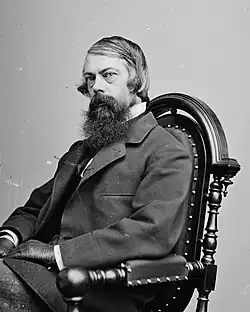
Republican Lieutenant Governor of Rhode Island Samuel G. Arnold was elected September 5, 1862 to finish Simmons's term.
 Samuel G. Arnold (Republican) 87.65%
Samuel G. Arnold (Republican) 87.65%- Nathan F. Dixon II (Republican) 8.64%
- Elisha Dyer (Republican) 1.24%
- Thomas G. Turner (Republican) 1.24%
- Moses B. Lockwood (Unknown) 1.24%[3][2]
Rhode Island (regular)
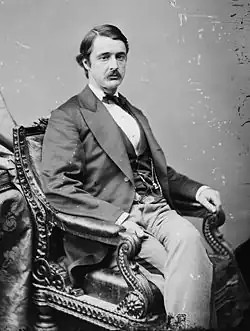
Republican Governor of Rhode Island William Sprague IV was elected to the next term.
 William Sprague IV (Republican) 89.32%
William Sprague IV (Republican) 89.32%- James F. Simmons (Republican) 4.85%
- Nathan F. Dixon II (Republican) 4.85%[4]
Tennessee
| |||
|
| |||
| |||
Incumbent Democrat Andrew Johnson resigned on March 4, 1862, following his appointment as military governor of Tennessee. The Tennessee General Assembly did not hold an election for the next term, and the seat remained vacant until 1866.[89]
Texas
| |||
|
| |||
| |||
Incumbent Democrat Louis T. Wigfall was expelled from the Senate on July 11, 1861. The Texas Legislature did not hold an election for the next term, and the seat remained vacant until 1870.[90]
Vermont
Virginia
West Virginia
| |||||||||||||||||||||||||||||||||
Needed to win: Majority support of the Joint Session of the Legislature[f] | |||||||||||||||||||||||||||||||||
|---|---|---|---|---|---|---|---|---|---|---|---|---|---|---|---|---|---|---|---|---|---|---|---|---|---|---|---|---|---|---|---|---|---|
| |||||||||||||||||||||||||||||||||
| |||||||||||||||||||||||||||||||||
There were two races for the new state.
Peter G. Van Winkle and Waitman T. Willey, both Unconditional Unionists, were elected August 4, 1863.
Van Winkle would serve just until the 1869 end of his term.
Before being elected senator from West Virginia, Willey was a senator from Virginia representing the Restored Government of Virginia, presenting their petition to Congress for West Virginia's statehood. He would be re-elected in 1865 to the next term served until the end of that term in 1871.
| Party | Candidate | Ballots | ||||||
|---|---|---|---|---|---|---|---|---|
| 1st | 2nd | 3rd | 4th | 5th | 6th | |||
| Unconditional Union | Waitman Willey | 50 | Elected | |||||
| Unconditional Union | Peter Van Winkle | 22 | 19 | 23 | 26 | 33 | 46 | |
| Republican | Archibald Campbell | 27 | 26 | 22 | 22 | 15 | 12 | |
| Democratic | Benjamin H. Smith | 24 | 17 | 13 | 5 | 4 | 2 | |
| Democratic | Daniel Lamb | Not nominated | 6 | 6 | With. | |||
| Scattering | 10 | 6 | 8 | 8 | 9 | 7 | ||
| Total | 133 | 68 | 66 | 67 | 67 | 67 | ||
| Needed to win | 35 | 35 | 34 | 34 | 34 | 34 | ||
Wisconsin
| |||||||||||||||||
| |||||||||||||||||
| |||||||||||||||||
Incumbent Republican senator James R. Doolittle was re-elected by the 16th Wisconsin Legislature on the first ballot, January 22, 1863.[5]
- ▌
 James R. Doolittle (Republican) 55.30%
James R. Doolittle (Republican) 55.30% - ▌ Edward George Ryan (Democratic) 43.18%
- ▌ Matthew H. Carpenter (Republican) 0.76%
- ▌ James S. Brown (Democratic) 0.76%
See also
Notes
- ^ 20 seats would remain vacant due to Southern secession.
- ^ as Republican Conference Chair
- ^ a b c d e f Same party result in the regular and the special elections, although different winners
- ^ Also appointed as a Unionist to finish the current term
- ^ The U.S. congressional delegation from Missouri in the 38th Congress included six Emancipationists, (including four Immediate Emancipationists, one Emancipationist, and one Gradual Emancipationist,) two Democrats, and one Conservative Unionist.[49]
- ^ During the first ballot, members were allowed to cast two votes simultaneously, nearly doubling the number of votes in the election. However, the necessary threshold for election stood at a majority of members voting (35) rather than a majority of votes themselves (67), allowing Willey to win on the first ballot. On successive ballots, each member only cast one vote, as there remained only one seat left to fill.
- ^ "17th Amendment to the U.S. Constitution: Direct Election of U.S. Senators (1913)". National Archives and Records Administration. February 8, 2022.
- ^ a b Manual with rules and orders for the use of the General Assembly of the State of Rhode Island. Rhode Island manual-1973/74. Providence Press Co.
- ^ a b c "Our Campaigns - RI US Senate - Special Election Race - Sep 05, 1862". OurCampaigns.com. Retrieved November 16, 2020.
- ^ a b "Our Campaigns - RI US Senate Race - May 28, 1862". OurCampaigns.com. Retrieved November 16, 2020.
- ^ a b "Joint Convention". Journal of the Assembly of Wisconsin (Report). Wisconsin Legislature. 1863. pp. 85–86. Retrieved March 1, 2025 – via HathiTrust.
- ^ a b Congressional Quarterly 1985, p. 581.
- ^ Thompson 1952, p. 114.
- ^
- "The Union Caucus [...]". Nevada Journal. January 14, 1863.
- "Elevated". Mountain Democrat. February 14, 1863.
- ^ Hittell 1898, pp. 335–38.
- ^ "Election of Senator". Weekly Trinity Journal. February 21, 1863.
- ^ California 1863, pp. 197.
- ^ Hittell 1898, p. 338.
- ^ a b "At a caucus [...]". Litchfield Enquirer. May 22, 1862.
- ^ "The Legislature [...]". Litchfield Enquirer. May 29, 1862.
- ^ Congressional Quarterly 1985, p. 582.
- ^ Delaware 1863, p. 58.
- ^ "Edward G. Bradford, Esq". Delaware State Journal. January 13, 1863.
- ^ Congressional Quarterly 1985, p. 583.
- ^ Congressional Quarterly 1985, p. 585.
- ^ Illinois 1863, p. 104.
- ^ Thornbrough 1995, p. 116, 185.
- ^ "From Indianapolis". Daily Evansville Journal. January 9, 1863.
- ^ Thornbrough 1995, p. 185.
- ^ Indiana 1863, p. 70.
- ^ Indiana 1863, pp. 71–72.
- ^ Congressional Quarterly 1985, p. 589.
- ^ "Legislature of Maine". Portland Daily Press. January 14, 1863.
- ^ Congressional Quarterly 1985.
- ^ Maryland 1862, pp. 735–36; Baker 1973, pp. 65, 79.
- ^ Congressional Quarterly 1985, p. 590.
- ^ Donald 1970, pp. 76, 63, 75, 77–78.
- ^ Donald 1970, p. 79.
- ^ Smith 2006, p. 62.
- ^ Baum 1984, pp. 63–65.
- ^ "Charles Sumner". The Independent. January 22, 1863.
- ^ a b c Congressional Quarterly 1985, p. 591.
- ^ "Election of United States Senator". Hillsdale Standard. January 7, 1862.
- ^ "The two Houses [...]". Grand Haven News. January 8, 1862.
- ^ a b "State Legislature". Cass County Republican. January 15, 1863.
- ^ Michigan 1863, pp. 16, 19–20.
- ^ "Senatorial Caucus". Weekly Pioneer and Democrat. January 16, 1863.
- ^ "Gov. Ramsey Nominated for Senator". Weekly Pioneer and Democrat. January 16, 1863.
- ^ Minnesota 1863, pp. 28–29.
- ^ Haugland 1961, p. 333.
- ^ a b c Congressional Quarterly 1985, p. 592.
- ^ Parrish 1963, pp. 135–36.
- ^ Annual Cyclopaedia 1863, p. 595.
- ^ Parrish 1971, p. 94.
- ^ Evening Journal Almanac 1864, p. 51; Mering 1959, p. 222.
- ^ a b "From Missouri". New York Daily Tribune. January 17, 1863.
- ^ "Our St. Louis Letter". Chicago Daily Tribune. February 11, 1863.
- ^ a b Missouri 1863a, pp. 41–42.
- ^ a b c Parrish 1963, p. 172.
- ^ Parrish 1971, pp. 101, 103.
- ^ "The Radical Triumph in Missouri". Chicago Daily Tribune. November 18, 1863.
- ^ Parrish 1971, p. 104.
- ^ Missouri 1863a, p. 41.
- ^ Congressional Quarterly 1985, p. 593.
- ^
- "Miscellaneous News". New York Herald. January 11, 1863.
- "Our St. Louis Letter". Chicago Daily Tribune. February 11, 1863.
- ^ Missouri 1863a, pp. 42, 52–53.
- ^ Missouri 1863a, p. 156.
- ^ "Missouri Senator". Daily National Intelligencer. February 4, 1863.
- ^ Missouri 1863a, pp. 156, 210.
- ^ Missouri 1863b, pp. 19.
- ^ Missouri 1863b, p. 20.
- ^ Missouri 1863b, p. 21.
- ^ Congressional Quarterly 1985, p. 595.
- ^ a b Knapp 1924, p. 81.
- ^ New Jersey 1863, pp. 448–49.
- ^ a b "The Hon. William Wright [...]". New York Daily Tribune. February 27, 1863.
- ^ Knapp 1924, p. 91.
- ^ New Jersey 1863, p. 450.
- ^ Knapp 1924, p. 135.
- ^ Congressional Quarterly 1985, p. 596.
- ^ a b "Important from Albany" (PDF). New York Times. February 3, 1863.
- ^ "The Adjourned Democratic Caucus" (PDF). New York Times. February 4, 1863.
- ^ New York 1863a, pp. 95–96; New York 1863b, pp. 151–54.
- ^ "Union Senatorial Caucus". Belmont Chronicle. January 22, 1863.
- ^ "End of the Senatorial Contest". Cleveland Morning Leader. January 19, 1863.
- ^ "Hon. B. F. Wade Nominated for United States Senator". Weekly Perrysburg Journal. January 21, 1863.
- ^ Ohio 1863, p. 70.
- ^ a b Congressional Quarterly 1985, p. 599.
- ^ Oregon 1862, p. 29.
- ^ Carey 1922, p. 650.
- ^ "Senatorial Nomination". Columbia Democrat and Bloomsburg General Advertiser. January 24, 1863.
- ^ "Great Excitement at Harrisburg". New York Daily Tribune. January 14, 1863.
- ^ Bradley 1964, p. 193.
- ^ Bradley 1964, p. 194.
- ^ Congressional Quarterly 1985, p. 602.
- ^ Congressional Quarterly 1985, p. 603.
Bibliography
Primary sources
- Annual Cyclopaedia (1863). The American Annual Cyclopaedia and Register of Important Events of the Year 1862. New York: D. Appleton & Co.
- California (1863). The Journal of the Assembly [...]. Sacramento.
- Delaware (1863). Journal of the House of Representatives [...]. Dover.
- Evening Journal Almanac (1864). The Evening Journal Almanac: 1864. Albany.
- Illinois (1863). Journal of the House of Representatives [...]. Springfield.
- Indiana (1863). Journal of the House of Representatives [...]. Indianapolis.
- Maryland (1862). Journal of the Proceedings of the House of Delegates [...]. Annapolis.
- Michigan (1863). Journal of the Senate [...]. Lansing.
- Minnesota (1863). Journal of the House of Representatives [...]. St. Paul.
- Missouri (1863a). Journal of the Senate [...]. Jefferson City.
- Missouri (1863b). Journal of the House of Representatives [...]. Jefferson City.
- New Jersey (1863). Journal of the Ninteenth Senate [...]. Morristown.
- New York (1863a). Journal of the Senate [...]. Albany.
- New York (1863b). Journal of the Assembly [...]. Albany.
- Ohio (1863). Journal of the House of Representatives [...]. Columbus.
- Oregon (1862). Journal of the Proceedings of the House [...]. Salem.
Secondary sources
- Baker, Jean H. (1973). The Politics of Continuity: Maryland Political Parties from 1858 to 1870. Baltimore: Johns Hopkins University Press.
- Baum, Dale (1984). The Civil War Party System: The Case of Massachusetts, 1848–1876. Chapel Hill: University of North Carolina Press.
- Bradley, Erwin Stanley (1964). The Triumph of Militant Republicanism: A Study of Pennsylvania and Presidential Politics, 1860–1872. Philadelphia: University of Pennsylvania Press.
- Carey, Charles Henry (1922). History of Oregon. Chicago: Pioneer Historical Publishing Company.
- Congressional Quarterly (1985). Congressional Quarterly's Guide to U.S. Elections (2nd ed.). Washington D.C.: Congressional Quarterly. ISBN 978-0-87187-339-2.
- Donald, David (1970). Charles Sumner and the Rights of Man. New York: Alfred A. Knopf.
- Haugland, John C. (December 1961). "Politics, Patronage, and Ramsey's Rise to Power, 1861-63". Minnesota History. 37 (8): 324–34.
- Hittell, Theodore H. (1898). History of California. San Francisco.
- Knapp, Charles Merriam (1924). New Jersey Politics during the Period of the Civil War and Reconstruction. Geneva, New York: J. W. Humphrey.
- Mering, John (April 1959). "The Political Transition of James S. Rollins". Missouri Historical Review. 53 (3): 217–226.
- Parrish, William E. (1971). A History of Missouri, Volume 3: 1860 to 1875. Columbia: University of Missouri Press. ISBN 978-0-8262-0108-9.
- Parrish, William E. (1963). Turbulent Partnership: Missouri and the Union, 1861–1865. Columbia, MO: University of Missouri Press. LCCN 63-8072.
- Smith, Adam I. P. (2006). No Party Now: Politics in the Civil War North. New York: Oxford University Press. ISBN 978-0-19-518865-3.
- Thompson, William F. (1952). The Political Career of Milton Slocum Latham of California (PhD thesis). Stanford University.
- Thornbrough, Emma Lou (1995). Indiana in the Civil War Era, 1850–1880. Indianapolis: Indiana Historical Society.
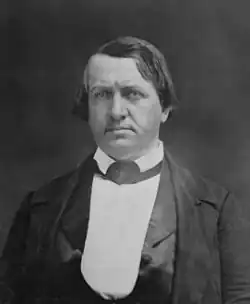

_a.jpg)
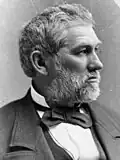
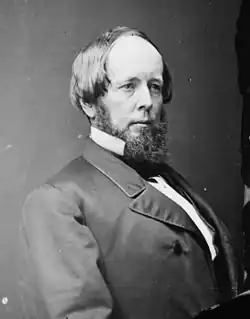
_(3x4a).jpg)

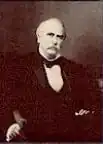
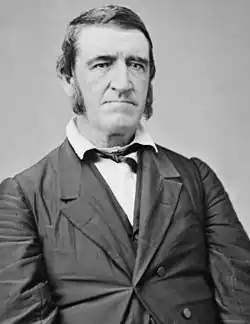
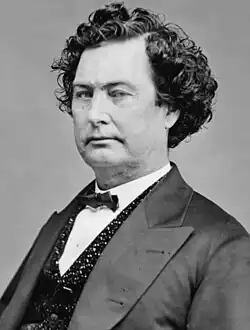
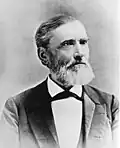
.jpg)

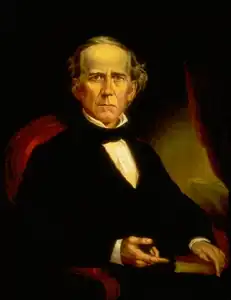
.jpg)

.jpg)

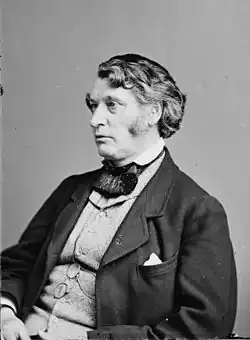
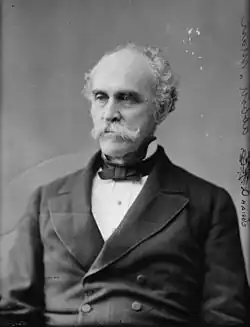
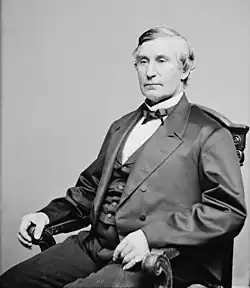
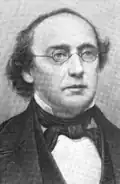
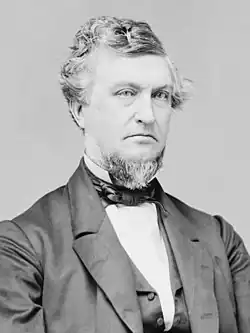
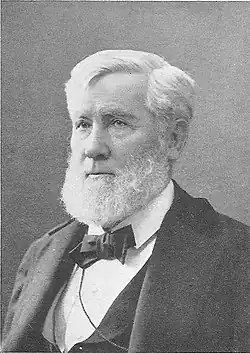
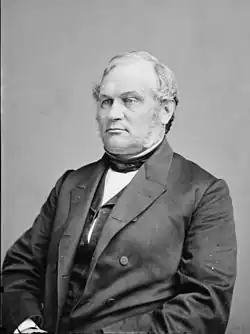
.png)
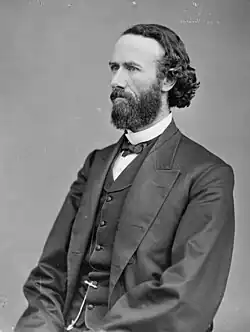
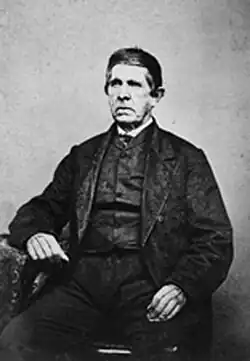
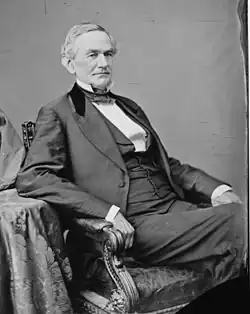
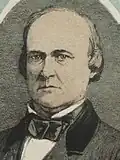
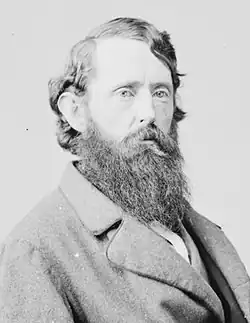
.png)
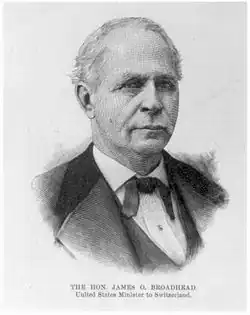
.jpg)
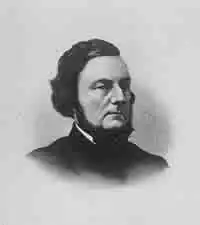
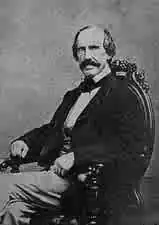
.jpg)
.jpg)
.jpg)
.jpg)
.jpg)
.jpg)
.jpg)
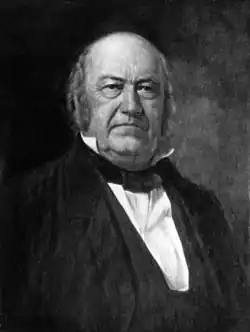
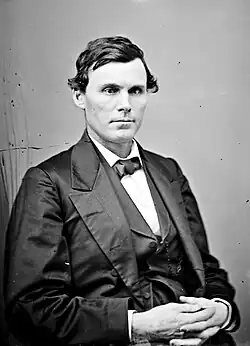

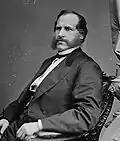
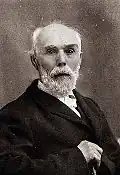
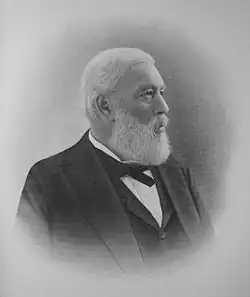
.jpg)
.jpg)
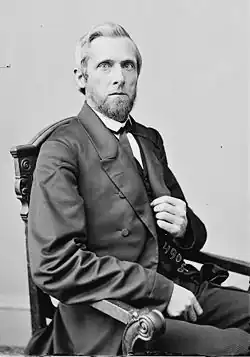


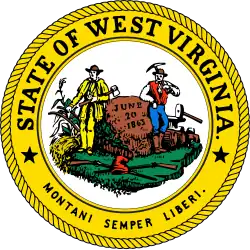
.jpg)
